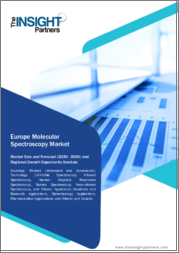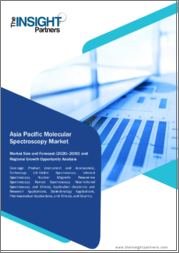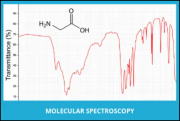
|
시장보고서
상품코드
1567813
아시아태평양의 분자 분광법 시장 예측(-2030년) : 지역 분석 - 제품별, 기술별, 용도별Asia Pacific Molecular Spectroscopy Market Forecast to 2030 - Regional Analysis - by Product, Technology, and Application |
||||||
아시아태평양의 분자 분광법 시장은 2022년 8억 4,903만 달러로 평가되며, 2030년에는 12억 8,151만 달러에 달할 것으로 예상되며, 2022년부터 2030년까지 연평균 5.3%의 CAGR을 기록할 것으로 예상됩니다.
핵자기공명분광법 이용 증가로 아시아태평양의 분자 분광법 시장 활성화
NMR은 분자 구조를 가진 시료의 순도를 결정하기 위해 품질 관리 및 연구에 사용되는 분석 기술이며, NMR은 분석 화학, 연결 물질 과학, 고분자의 구조와 역학에 강력한 힘을 발휘하며, NMR 분광법의 장점은 적은 샘플 조제와 연구 대상 분자를 보존하는 비파괴적인 방법입니다. NMR 분광법은 유기 화합물의 구조를 파악하는 주요 기술 중 하나로 제약, 생명공학, 바이오테크놀러지, 바이오의약품 등 다양한 분야에서 널리 활용되고 있습니다. 또한 NMR 분광법은 히트-투-리드 검출, 대사산물 프로파일링, in vivo 자기공명분광법, 자기공명영상 등 생화학 및 생물학적 응용 분야에서도 점점 더 많이 활용되고 있습니다. 최근 몇 년 동안 NMR은 대사체학에 크게 도입되고 있습니다. 이 급성장하고 있는 분야는 대사물질을 연구하여 질병에 대한 정보를 얻는 분야입니다. 대사체학은 주로 연구용으로 사용되어 왔지만, 실험실 진단에 매우 유용하다는 것이 입증되었습니다. NMR 분광법은 소변, 혈장, 혈청 등 다양한 체액에서 대사 및 세포 과정의 다운스트림 산물에 대한 귀중한 정보를 제공하여 특정 조직 및 장기의 상태에 대한 인사이트를 제공합니다. 새로운 발전을 거듭하며 필요한 민감도와 범용성을 향상시켜 응용의 폭을 넓혀가고 있습니다. 첨단 NMR 진단 기술을 헬스케어 산업의 최전선에 도입함으로써 다양한 질병의 신속하고 비용 효율적인 진단이 가능해질 것으로 보입니다. 연구와 산업계의 요구가 계속 진화하는 가운데, NMR 분광법은 분석 기술의 최전선에 서서 분광법 시장의 성장을 주도하고 있습니다. 또한, 분자 분광법은 환경 보존에 대한 연구 증가와 환경 연구를 촉진하는 정부의 유리한 정책으로 인해 분자 분광법 시장이 크게 성장하고 있습니다. 분자 분광법은 조사 및 환경 조사에서 분석 도구로 자주 사용됩니다. 따라서 시장 참여자들은 다양한 환경 연구를 위해 혁신적인 분자 분광법을 모색하고 있습니다. 이러한 추세는 예측 기간 동안 지속될 것으로 예상되며, 이는 시장에 성장 기회를 제공할 것으로 예상됩니다.
아시아태평양의 분자 분광법 시장 개요
아시아태평양의 분자 분광법 시장은 중국, 일본, 인도, 한국, 호주, 기타 아시아태평양으로 구분되며, 2022년에는 중국이 가장 큰 시장 점유율을 차지할 것으로 예상되며, 인도는 시장에서 큰 성장률을 보일 것으로 예측됩니다. 그 배경에는 중국 바이오의약품 산업이 제네릭 의약품 중심에서 혁신 중심으로 크게 변화하고 있기 때문입니다. 또한 산업화 촉진과 신약, 첨단 의료기기 및 기술 적용이 중국 시장의 성장 요인으로 작용하고 있습니다. 또한, 지리적 확장 및 기타 전략을 위해 아시아태평양 국가에 주목하는 시장 기업의 증가와 연구 센터 및 정부 자금의 증가는 분자 분광법 시장의 성장에 박차를 가하고 있습니다.
아시아태평양의 분자 분광법 시장 매출 및 2030년까지 예측(금액)
아시아태평양의 분자 분광법 시장 세분화
아시아태평양의 분자 분광법 시장은 제품, 기술, 응용 분야, 국가별로 분류됩니다.
제품별로 아시아태평양의 분자 분광법 시장은 장비와 액세서리로 양분되며, 2022년 시장 점유율은 장비 부문이 더 큽니다.
기술별로 아시아태평양의 분자 분광법 시장은 자외선 가시광선 분광법, 적외선 분광법, 핵자기공명 분광법, 라만 분광법, 근적외선 분광법, 기타로 분류됩니다. 자외선 가시광선 분광법 부문은 2022년 가장 큰 시장 점유율을 차지했습니다.
용도별로 아시아태평양의 분자 분광법 시장은 학술 및 연구용, 생명공학용, 제약용, 기타로 구분됩니다. 학술 및 연구 응용 분야가 2022년 가장 큰 시장 점유율을 차지했습니다.
국가별로는 아시아태평양의 분자 분광법 시장은 호주, 중국, 인도, 일본, 한국, 기타 아시아태평양으로 구분되며, 2022년 아시아태평양의 분자 분광법 시장 점유율은 중국이 독점했습니다.
Horiba Ltd, Thermo Fisher Scientific Inc, Merck KGaA, Revvity Inc, Ostec Instruments, JEOL Ltd, Shimadzu Corp, JASCO Corp, Bruker Corp, Agilent Technologies, Inc, Oxfords Instruments plc, Teledyne Princeton Instruments 등이 아시아태평양의 분자 분광법 시장에서 활동하는 주요 기업입니다.
목차
제1장 소개
제2장 주요 요약
- 주요 인사이트
제3장 조사 방법
- 조사 범위
- 2차 조사
- 1차 조사
제4장 아시아태평양의 분자 분광법시장 - 주요 시장 역학
- 시장 성장 촉진요인
- 분자 분광법 보급과 이용 확대
- 제약 업계의 급성장
- 시장 성장 억제요인
- 숙련기술자의 부족과 보수·설치 비용 급등
- 시장 기회
- 핵자기공명 분광법 이용 증가
- 향후 동향
- Drug Discovery와 연구개발 증가
- 성장 촉진요인과 억제요인의 영향
제5장 아시아태평양의 분자 분광법시장 분석 : 아시아태평양 분석
- 분자 분광법 시장 개요
- 분자 분광법 시장 매출, 2020-2030년
제6장 아시아태평양의 분자 분광법시장 분석 : 제품별
- 개요
- 장비
- 액세서리
제7장 아시아태평양의 분자 분광법시장 분석 : 기술별
- 자외선 가시광선 분광법
- 적외 분광법
- 핵자기공명 분광법
- 라만 분광법
- 근적외선 분광법
- 기타
제8장 아시아태평양의 분자 분광법시장 분석 : 용도별
- 학술·연구 용도
- 바이오테크놀러지 용도
- 제약 애플리케이션
- 기타
제9장 아시아태평양의 분자 분광법시장 - 국가별 분석
- 아시아태평양의 분자 분광법시장 : 국가별 분석
- 아시아태평양의 분자 분광법시장 : 매출과 예측 분석 : 국가별
- 중국 : 개요
- 일본 : 개요
- 인도 : 개요
- 호주 : 개요
- 한국 : 상황 개요
- 아시아태평양의 기타 : 개요
- 아시아태평양의 분자 분광법시장 : 매출과 예측 분석 : 국가별
제10장 분자 분광법시장 - 업계 상황
- 개요
- 분자 분광법 시장의 성장 전략
- 무기적 성장 전략
- 유기적 성장 전략
제11장 기업 개요
- HORIBA, Ltd.
- Thermo Fisher Scientific Inc
- Merck KGaA
- Revvity, Inc.
- Ostec Instruments
- JEOL Ltd.
- Shimadzu Corp
- JASCO Corp
- Bruker Corp
- Agilent Technologies, Inc.
- Oxford Instruments plc
- Teledyne Princeton Instruments
제12장 부록
ksm 24.10.24The Asia Pacific molecular spectroscopy market was valued at US$ 849.03 million in 2022 and is expected to reach US$ 1,281.51 million by 2030; it is estimated to register a CAGR of 5.3% from 2022 to 2030.
Increasing Use of Nuclear Magnetic Resonance Spectroscopy Boosts Asia Pacific Molecular Spectroscopy Market
NMR is an analytical technique used for quality control and research to determine the purity of a sample with its molecular structure. NMR is a powerful tool in terms of analytical chemistry and consolidated matter science, as well as for elucidating the structure and dynamics of macromolecules. The benefits of NMR spectroscopy are that it requires less sample preparation and is a non-destructive method that preserves the molecules being studied. NMR spectroscopy has become one of the leading techniques for finding out the structure of organic compounds and is widely used in various areas such as pharmaceuticals, biotechnology, and biopharmaceuticals. In addition, NMR spectroscopy is increasingly used in biochemical and biological applications, including hit-to-lead detection, metabolite profiling, in vivo magnetic resonance spectroscopy, and magnetic resonance imaging. In recent years, NMR has been heavily incorporated into metabolomics. This rapidly growing field involves the study of metabolites to gain information about diseases. Metabolomics has traditionally focused on research applications and can prove extremely useful in laboratory diagnostics. Metabolomics can provide valuable information about downstream products of metabolic and cellular processes and provide insights into the state of specific tissues and organs. NMR spectroscopy has successfully quantified metabolite concentrations in various fluids, including urine, plasma, and serum. New developments have been made in NMR spectroscopy, driving much-needed improvements in sensitivity and versatility, and expanding the number of applications. Introducing advanced NMR diagnostic techniques to the frontline healthcare industry will likely enable rapid and cost-effective diagnosis of various diseases. As research and industry needs continue to evolve, NMR spectroscopy remains at the forefront of analytical techniques and drives growth in the spectroscopy market. In addition, molecular spectroscopy has propelled significantly due to increasing research in conservation and favorable government policies to promote environmental studies. Molecular spectroscopy is often used as an analytical tool in surveys and environmental studies. Therefore, market participants are exploring innovative molecular spectroscopy methods for various environmental studies. This is expected to continue during the forecast period and provide growth opportunities for the market.
Asia Pacific Molecular Spectroscopy Market Overview
The Asia Pacific molecular spectroscopy market is segmented into China, Japan, India, South Korea, Australia, and the Rest of Asia Pacific. China is predicted to hold the largest share of the market in 2022, and India is expected to show a significant growth rate in the market. This is due to China's biopharmaceutical industry undergoing a tremendous shift, evolving from a generic-focused to a thriving innovation hub. Additionally, promoting industrialization and the application of novel drugs, high-end medical devices, and techniques are responsible for the market growth in China. Further, the growing number of market players focusing on countries in Asia Pacific for geographical expansion and other strategies and the rising research centers and government funding fuel the molecular spectroscopy market growth.
Asia Pacific Molecular Spectroscopy Market Revenue and Forecast to 2030 (US$ Million)
Asia Pacific Molecular Spectroscopy Market Segmentation
The Asia Pacific molecular spectroscopy market is segmented into product, technology, application, and country.
Based on product, the Asia Pacific molecular spectroscopy market is bifurcated into instrument and accessories. The instrument segment held a larger market share in 2022.
In terms of technology, the Asia Pacific molecular spectroscopy market is categorized into UV-Visible spectroscopy, infrared spectroscopy, nuclear magnetic resonance spectroscopy, Raman spectroscopy, Near-infrared spectroscopy, and others. The UV-Visible spectroscopy segment held the largest market share in 2022.
By application, the Asia Pacific molecular spectroscopy market is segmented into academic and research applications, biotechnology applications, pharmaceutical applications, and others. The academic and research applications segment held the largest market share in 2022.
Based on country, the Asia Pacific molecular spectroscopy market is segmented into Australia, China, India, Japan, South Korea, and the Rest of Asia Pacific. China dominated the Asia Pacific molecular spectroscopy market share in 2022.
Horiba Ltd; Thermo Fisher Scientific Inc; Merck KGaA; Revvity Inc; Ostec Instruments; JEOL Ltd; Shimadzu Corp; JASCO Corp; Bruker Corp; Agilent Technologies, Inc.; Oxfords Instruments plc; and Teledyne Princeton Instruments are some of the leading companies operating in the Asia Pacific molecular spectroscopy market.
Table Of Contents
1. Introduction
- 1.1 The Insight Partners Research Report Guidance
- 1.2 Market Segmentation
2. Executive Summary
- 2.1 Key Insights
3. Research Methodology
- 3.1 Coverage
- 3.2 Secondary Research
- 3.3 Primary Research
4. Asia Pacific Molecular Spectroscopy Market-Key Market Dynamics
- 4.1 Market Drivers
- 4.1.1 Growing Adoption and Use of Molecular Spectroscopy
- 4.1.2 Rapid Growth of Pharmaceutical Industry
- 4.2 Market Restraints
- 4.2.1 Shortage of Technically Skilled Personnel and High Cost of Maintenance and Installation
- 4.3 Market Opportunities
- 4.3.1 Increasing Use of Nuclear Magnetic Resonance Spectroscopy
- 4.4 Future Trends
- 4.4.1 Increase in Drug Discovery and R&D
- 4.5 Impact of Drivers and Restraints:
5. Molecular Spectroscopy Market - Asia Pacific Analysis
- 5.1 Molecular Spectroscopy Market Overview
- 5.2 Molecular Spectroscopy Market Revenue (US$ Million), 2020-2030
6. Asia Pacific Molecular Spectroscopy Market Analysis-by Product
- 6.1 Overview
- 6.2 Instrument
- 6.2.1 Overview
- 6.2.2 Instrument: Molecular Spectroscopy Market - Revenue and Forecast to 2030 (US$ Million)
- 6.3 Accessories
- 6.3.1 Overview
- 6.3.2 Accessories: Molecular Spectroscopy Market - Revenue and Forecast to 2030 (US$ Million)
7. Asia Pacific Molecular Spectroscopy Market Analysis-by Technology
- 7.1 Overview
- 7.2 UV-Visible Spectroscopy
- 7.2.1 Overview
- 7.2.2 UV-Visible Spectroscopy: Molecular Spectroscopy Market - Revenue and Forecast to 2030 (US$ Million)
- 7.3 Infrared Spectroscopy
- 7.3.1 Overview
- 7.3.2 Infrared Spectroscopy: Molecular Spectroscopy Market - Revenue and Forecast to 2030 (US$ Million)
- 7.4 Nuclear Magnetic Resonance Spectroscopy
- 7.4.1 Overview
- 7.4.2 Nuclear Magnetic Resonance Spectroscopy: Molecular Spectroscopy Market - Revenue and Forecast to 2030 (US$ Million)
- 7.5 Raman Spectroscopy
- 7.5.1 Overview
- 7.5.2 Raman Spectroscopy: Molecular Spectroscopy Market - Revenue and Forecast to 2030 (US$ Million)
- 7.6 Near-Infrared Spectroscopy
- 7.6.1 Overview
- 7.6.2 Near-Infrared Spectroscopy: Molecular Spectroscopy Market - Revenue and Forecast to 2030 (US$ Million)
- 7.7 Others
- 7.7.1 Overview
- 7.7.2 Others: Molecular Spectroscopy Market - Revenue and Forecast to 2030 (US$ Million)
8. Asia Pacific Molecular Spectroscopy Market Analysis-by Application
- 8.1 Overview
- 8.2 Academic and Research Applications
- 8.2.1 Overview
- 8.2.2 Academic and Research Applications: Molecular Spectroscopy Market - Revenue and Forecast to 2030 (US$ Million)
- 8.3 Biotechnology Applications
- 8.3.1 Overview
- 8.3.2 Biotechnology Applications: Molecular Spectroscopy Market - Revenue and Forecast to 2030 (US$ Million)
- 8.4 Pharmaceutical Applications
- 8.4.1 Overview
- 8.4.2 Pharmaceutical Applications: Molecular Spectroscopy Market - Revenue and Forecast to 2030 (US$ Million)
- 8.5 Others
- 8.5.1 Overview
- 8.5.2 Others: Molecular Spectroscopy Market - Revenue and Forecast to 2030 (US$ Million)
9. Asia Pacific Molecular Spectroscopy Market-Country Analysis
- 9.1 Asia Pacific Molecular Spectroscopy Market-Country Analysis
- 9.1.1 Asia Pacific: Molecular Spectroscopy Market - Revenue and Forecast Analysis - by Country
- 9.1.1.1 China: Overview
- 9.1.1.1.1 China: Molecular Spectroscopy Market - Revenue and Forecast to 2030 (US$ Million)
- 9.1.1.1.2 China: Molecular Spectroscopy Market Breakdown, by Product
- 9.1.1.1.3 China: Molecular Spectroscopy Market Breakdown, by Technology
- 9.1.1.1.4 China: Molecular Spectroscopy Market Breakdown, by Application
- 9.1.1.2 Japan: Overview
- 9.1.1.2.1 Japan: Molecular Spectroscopy Market - Revenue and Forecast to 2030 (US$ Million)
- 9.1.1.2.2 Japan: Molecular Spectroscopy Market Breakdown, by Product
- 9.1.1.2.3 Japan: Molecular Spectroscopy Market Breakdown, by Technology
- 9.1.1.2.4 Japan: Molecular Spectroscopy Market Breakdown, by Application
- 9.1.1.3 India: Overview
- 9.1.1.3.1 India: Molecular Spectroscopy Market - Revenue and Forecast to 2030 (US$ Million)
- 9.1.1.3.2 India: Molecular Spectroscopy Market Breakdown, by Product
- 9.1.1.3.3 India: Molecular Spectroscopy Market Breakdown, by Technology
- 9.1.1.3.4 India: Molecular Spectroscopy Market Breakdown, by Application
- 9.1.1.4 Australia: Overview
- 9.1.1.4.1 Australia: Molecular Spectroscopy Market - Revenue and Forecast to 2030 (US$ Million)
- 9.1.1.4.2 Australia: Molecular Spectroscopy Market Breakdown, by Product
- 9.1.1.4.3 Australia: Molecular Spectroscopy Market Breakdown, by Technology
- 9.1.1.4.4 Australia: Molecular Spectroscopy Market Breakdown, by Application
- 9.1.1.5 South Korea: Overview
- 9.1.1.5.1 South Korea: Molecular Spectroscopy Market - Revenue and Forecast to 2030 (US$ Million)
- 9.1.1.5.2 South Korea: Molecular Spectroscopy Market Breakdown, by Product
- 9.1.1.5.3 South Korea: Molecular Spectroscopy Market Breakdown, by Technology
- 9.1.1.5.4 South Korea: Molecular Spectroscopy Market Breakdown, by Application
- 9.1.1.6 Rest of Asia Pacific
- 9.1.1.6.1 Overview
- 9.1.1.6.2 Rest of Asia Pacific: Molecular Spectroscopy Market - Revenue and Forecast to 2030 (US$ Million)
- 9.1.1.6.3 Rest of Asia Pacific: Molecular Spectroscopy Market Breakdown, by Product
- 9.1.1.6.4 Rest of Asia Pacific: Molecular Spectroscopy Market Breakdown, by Technology
- 9.1.1.6.5 Rest of Asia Pacific: Molecular Spectroscopy Market Breakdown, by Application
- 9.1.1.1 China: Overview
- 9.1.1 Asia Pacific: Molecular Spectroscopy Market - Revenue and Forecast Analysis - by Country
10. Molecular Spectroscopy Market-Industry Landscape
- 10.1 Overview
- 10.2 Growth Strategies in the Molecular Spectroscopy Market
- 10.3 Inorganic Growth Strategies
- 10.3.1 Overview
- 10.4 Organic Growth Strategies
- 10.4.1 Overview
11. Company Profiles
- 11.1 HORIBA, Ltd.
- 11.1.1 Key Facts
- 11.1.2 Business Description
- 11.1.3 Products and Services
- 11.1.4 Financial Overview
- 11.1.5 SWOT Analysis
- 11.1.6 Key Developments
- 11.2 Thermo Fisher Scientific Inc
- 11.2.1 Key Facts
- 11.2.2 Business Description
- 11.2.3 Products and Services
- 11.2.4 Financial Overview
- 11.2.5 SWOT Analysis
- 11.2.6 Key Developments
- 11.3 Merck KGaA
- 11.3.1 Key Facts
- 11.3.2 Business Description
- 11.3.3 Products and Services
- 11.3.4 Financial Overview
- 11.3.5 SWOT Analysis
- 11.3.6 Key Developments
- 11.4 Revvity, Inc.
- 11.4.1 Key Facts
- 11.4.2 Business Description
- 11.4.3 Products and Services
- 11.4.4 Financial Overview
- 11.4.5 SWOT Analysis
- 11.4.6 Key Developments
- 11.5 Ostec Instruments
- 11.5.1 Key Facts
- 11.5.2 Business Description
- 11.5.3 Products and Services
- 11.5.4 Financial Overview
- 11.5.5 SWOT Analysis
- 11.5.6 Key Developments
- 11.6 JEOL Ltd.
- 11.6.1 Key Facts
- 11.6.2 Business Description
- 11.6.3 Products and Services
- 11.6.4 Financial Overview
- 11.6.5 SWOT Analysis
- 11.6.6 Key Developments
- 11.7 Shimadzu Corp
- 11.7.1 Key Facts
- 11.7.2 Business Description
- 11.7.3 Products and Services
- 11.7.4 Financial Overview
- 11.7.5 SWOT Analysis
- 11.7.6 Key Developments
- 11.8 JASCO Corp
- 11.8.1 Key Facts
- 11.8.2 Business Description
- 11.8.3 Products and Services
- 11.8.4 Financial Overview
- 11.8.5 SWOT Analysis
- 11.8.6 Key Developments
- 11.9 Bruker Corp
- 11.9.1 Key Facts
- 11.9.2 Business Description
- 11.9.3 Products and Services
- 11.9.4 Financial Overview
- 11.9.5 SWOT Analysis
- 11.9.6 Key Developments
- 11.10 Agilent Technologies, Inc.
- 11.10.1 Key Facts
- 11.10.2 Business Description
- 11.10.3 Products and Services
- 11.10.4 Financial Overview
- 11.10.5 SWOT Analysis
- 11.10.6 Key Developments
- 11.11 Oxford Instruments plc
- 11.11.1 Key Facts
- 11.11.2 Business Description
- 11.11.3 Products and Services
- 11.11.4 Financial Overview
- 11.11.5 SWOT Analysis
- 11.11.6 Key Developments
- 11.12 Teledyne Princeton Instruments
- 11.12.1 Key Facts
- 11.12.2 Business Description
- 11.12.3 Products and Services
- 11.12.4 Financial Overview
- 11.12.5 SWOT Analysis
- 11.12.6 Key Developments
12. Appendix
- 12.1 About The Insight Partners
- 12.2 Glossary of Terms

















